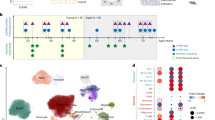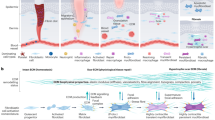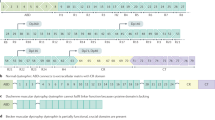Abstract
Duchenne muscular dystrophy (DMD) is an X-linked recessive muscle disease characterized by a lack of dystrophin expression. Myoblast transplantation and gene therapy have the potential of restoring dystrophin, thus decreasing the muscle weakness associated with this disease. In this study we present data on the myoblast mediated ex vivo gene transfer of full-length dystrophin to mdx (dystrophin deficient) mouse muscle as a model for autologous myoblast transfer. Both isogenic primary mdx myoblasts and an immortalized mdx cell line were transduced with an adenoviral vector that has all viral coding sequences deleted and encodes β-galactosidase and full-length dystrophin. Subsequently, these transduced myoblasts were injected into dystrophic mdx muscle, where the injected cells restored dystrophin, as well as dystrophin- associated proteins. A greater amount of dystrophin replacement occurred in mdx muscle following transplantation of mdx myoblasts isolated from a transgenic mouse overexpressing dystrophin suggesting that engineering autologous myoblasts to express high amounts of dystrophin might be beneficial. The ex vivo approach possesses attributes that make it useful for gene transfer to skeletal muscle including: (1) creating a reservoir of myoblasts capable of regenerating and restoring dystrophin to dystrophic muscle; and (2) achieving a higher level of gene transfer to dystrophic muscle compared with adenovirus-mediated direct gene delivery. However, as observed in direct gene transfer studies, the ex vivo approach also triggers a cellular immune response which limits the duration of transgene expression.
This is a preview of subscription content, access via your institution
Access options
Subscribe to this journal
Receive 12 print issues and online access
$259.00 per year
only $21.58 per issue
Buy this article
- Purchase on Springer Link
- Instant access to full article PDF
Prices may be subject to local taxes which are calculated during checkout
Similar content being viewed by others
Author information
Authors and Affiliations
Rights and permissions
About this article
Cite this article
Floyd, S., Clemens, P., Ontell, M. et al. Ex vivo gene transfer using adenovirus-mediated full-length dystrophin delivery to dystrophic muscles. Gene Ther 5, 19–30 (1998). https://doi.org/10.1038/sj.gt.3300549
Received:
Accepted:
Published:
Issue Date:
DOI: https://doi.org/10.1038/sj.gt.3300549
Keywords
This article is cited by
-
Genome Editing and Muscle Stem Cells as a Therapeutic Tool for Muscular Dystrophies
Current Stem Cell Reports (2017)
-
Expression of Dog Microdystrophin in Mouse and Dog Muscles by Gene Therapy
Molecular Therapy (2010)
-
Stem and Progenitor Cells in Skeletal Muscle Development, Maintenance, and Therapy
Molecular Therapy (2007)
-
Stable transduction of myogenic cells with lentiviral vectors expressing a minidystrophin
Gene Therapy (2005)
-
Muscle stem cells can act as antigen-presenting cells: implication for gene therapy
Gene Therapy (2004)



